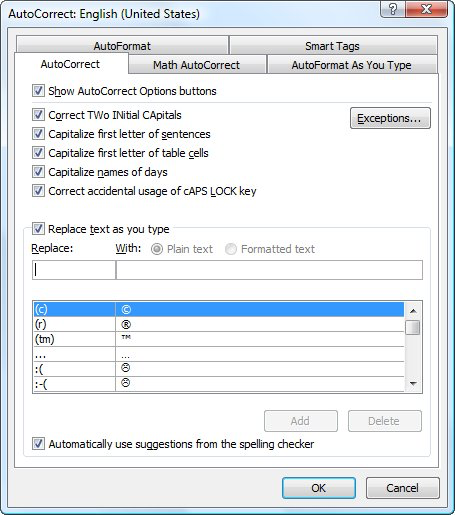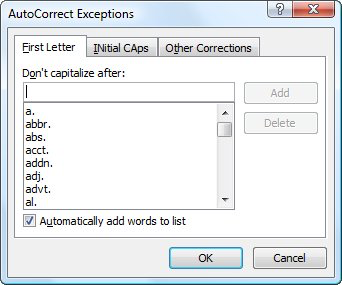 Please Note:
This article is written for users of the following Microsoft Word versions: 2007, 2010, 2013, 2016, 2019, 2021, 2024, and Word in Microsoft 365. If you are using an earlier version (Word 2003 or earlier), this tip may not work for you. For a version of this tip written specifically for earlier versions of Word, click here: Automatic AutoCorrect Exceptions for Beginning Sentences.
Please Note:
This article is written for users of the following Microsoft Word versions: 2007, 2010, 2013, 2016, 2019, 2021, 2024, and Word in Microsoft 365. If you are using an earlier version (Word 2003 or earlier), this tip may not work for you. For a version of this tip written specifically for earlier versions of Word, click here: Automatic AutoCorrect Exceptions for Beginning Sentences.
Automatic AutoCorrect Exceptions for Beginning Sentences
Written by Allen Wyatt (last updated March 22, 2025)
This tip applies to Word 2007, 2010, 2013, 2016, 2019, 2021, 2024, and Word in Microsoft 365
Ken asked about a problem he was having with AutoCorrect not capitalizing words at the beginning of sentences as he expected. When typing a document, he would sometimes discover that AutoCorrect was not capitalizing the first word of some sentences, despite being configured to do so.
The reason for this is because AutoCorrect watches (to a limited extent) how you type and tries to adjust itself for what it perceives as your needs. If you are typing along and Word makes an AutoCorrect correction, and you immediately backspace and type over the correction, Word figures that you don't want it to make those corrections any more in the future. To ensure this, it adds the last word of the sentence, with its ending punctuation, to the AutoCorrect exceptions list.
Depending on the way you type, this can cause some problems. For instance, consider this scenario:
- You finish a sentence and type the closing punctuation mark and space after the punctuation mark.
- You type the first word of the next sentence with the initial letter of that word in lowercase.
- You press the space after the first word, and AutoCorrect automatically capitalizes the first letter of that first word.
- Before starting on the second word, you change your mind about what the first word should be.
- You backspace through the old first word.
- You type a new first word, with the initial letter in lowercase.
When you type the space after this new first word, AutoCorrect does two things. First, it doesn't correct the capitalization of the first letter of the new first word—it leaves it lowercase. Second, it automatically adds the last word of the previous sentence, with its terminating punctuation mark, to the AutoCorrect exception list. This means that any time you end a sentence with that word in the future, AutoCorrect will not automatically adjust the capitalization of the first word in the following sentence.
If you don't want Word to behave this way (second-guessing why you are backspacing), then you should follow these steps:
- Display the Word Options dialog box. (In Word 2007 click the Office button and then click Word Options. In Word 2010 and later versions display the File tab of the ribbon and then click Options.)
- Click Proofing at the left side of the dialog box.
- Click the AutoCorrect Options button. Word displays the AutoCorrect dialog box. (See Figure 1.)

Figure 1. The AutoCorrect tab of the AutoCorrect dialog box.
- Click the Exceptions button. Word displays the AutoCorrect Exceptions dialog box. (See Figure 2.)

Figure 2. The AutoCorrect Exceptions dialog box.
- Clear the check box labeled Automatically Add Words to List.
- Click OK three times to dismiss all the dialog boxes.
WordTips is your source for cost-effective Microsoft Word training.
(Microsoft Word is the most popular word processing software in the world.)
This tip (6005) applies to Microsoft Word 2007, 2010, 2013, 2016, 2019, 2021, 2024, and Word in Microsoft 365. You can find a version of this tip for the older menu interface of Word here: Automatic AutoCorrect Exceptions for Beginning Sentences.
Author Bio
Allen Wyatt
With more than 50 non-fiction books and numerous magazine articles to his credit, Allen Wyatt is an internationally recognized author. He is president of Sharon Parq Associates, a computer and publishing services company. Learn more about Allen...
Understanding the Clipboard
You can use the Windows Clipboard to move information around in Word. To make the most of the Clipboard, it is helpful to ...
Discover More
Saving Information in a Non-Document Text File
Need to store some information in a plain text file? It's easy to do when you use a macro.
Discover More
Underlining Section References Automatically
If you have a document that has some sort of keyword within it (such as "Section") you may want to automatically format ...
Discover More
Getting Identical Margins
Need to get the margins on your document exactly right? It can be a challenge to get the Word settings where you need ...
Discover More
Embedding Fonts in a Document
Fonts are essential to getting your text to look just the way you want it to look. If you have a font that you use in a ...
Discover More
Making a Customized Theme Available to Others
Microsoft Office applications (including Word) allow you to work with collections of common formatting specifications, ...
Discover More



Comments